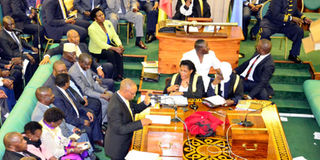Has passing age limit Bill buried national dialogue?

Tabled. Igara West MP Raphael Magyezi presents the age limit Bill in Parliament. PHOTO BY ALEX ESAGALA
On December 20, exactly three months after the police raided the offices of the Great Lakes Institute for Strategic Studies (Gliss) in Ntinda, Kampala, Parliament voted to amend the Constitution, scrapping age limits for presidential candidates, thus allowing President Museveni to stand again in 2021 aged 77.
The constitutional order when he was re-elected in 2016 was such that he was ineligible for re-election in 2021 because he would be above the then upper age limit of 75 years.
The two developments came as Gliss, working at the behest of the Inter-Religious Council of Uganda (IRCU) and The Elders Forum Uganda (TEFU), among other bodies, were organising a national dialogue campaign that was planned to kick off in February 2018.
Mr Godber Tumushabe, the executive director of Gliss, says the idea had been to prepare for a transition from a Museveni presidency.
“We felt that a transition from Museveni can only be negotiated. How does he leave? How do you secure his dignified exit and retirement? We don’t think that those are issues that can be resolved through the electoral process,” Mr Tumushabe says.
But with the removal of the upper age limit for the presidency, and with indications that Mr Museveni will run again in 2021, the plans for a national dialogue premised on his departure seem to have been thrown in jeopardy. But Mr Tumushabe remains optimistic.
“The amendments to the Constitution have been more disruptive than the freezing of our accounts, but now that they (amendments) are out of the way, we think that the process (of holding a dialogue) will continue next year,” Mr Tumushabe says.
He says while Mr Museveni does not appear keen on leaving power in the foreseeable future, the citizens need to generate perspectives on how to address some of the fundamental political, social and economic challenges that it is currently faced with.
This, he says, would enable Ugandans “to agree on a new national consensus to consolidate peace, democracy and inclusive development to achieve equal opportunity for all”.
But Col Shaban Bantariza, the deputy director of Uganda Media Centre, disagrees with Mr Tumushabe’s take on the state of affairs.
“National dialogues can only be held if there is a crisis or something near to a crisis, and do we have a crisis? Certainly not. What is the fundamental subject to be dialogued (on)? The subject of a dialogue is not there,” Col Bantariza says.
Mr Tumushabe, however, insists that the need for dialogue is so obvious that it should not be a question of debate.
“This country is moving towards a stalemate. Look at the youth unemployment, the shrinking economy, the rise in tribal tensions and political intolerance. We need to remain focused on building this platform so that when the stalemate happens, Ugandans have a place to go and discuss the future of the country,” he says.
Gliss has over the last several months organised informal consultations with media practitioners, religious leaders and other stakeholders, including civic leaders and members of the business community.
Politicians were meant to be the last batch of people to be consulted, but what happens after the consultations? Will the politicians be willing to participate in the planned dialogue?
Mr Rogers Mulindwa, a communications officer at the Secretariat of the ruling NRM party, says the party is interested in a “principled dialogue” with the Opposition.
“We (NRM) would be the most interested (in a national dialogue) if there are genuine issues that will benefit the country and not individual Oppositions leaders. Testimony to our goodwill is the fact that we accommodated some Opposition leaders after 2016. That is dialogue at the highest level,” Mr Mulindwa argues.
Mr Mulindwa was referring to President Museveni naming three Opposition or Opposition-leaning politicians in his cabinet after the 2016 elections.
After the polls, there were attempts by several groups, including what is called the Women’s Situation Room and the Norwegian Government, to mediate talks between President Museveni and Dr Kizza Besigye, his principal nemesis who claimed to have won the 2016 election.
Dr Besigye and the wider Opposition have since 2011 set conditions for them to participate in any form of dialogue with President Museveni, including having on the agenda how Mr Museveni leaves power.
There has not been any more mention of such efforts since the ruling party MPs and President Museveni started the push to remove age limits, efforts which were crystallised and realised in the last quarter of 2017.
The problem, though, is that the NRM’s shenanigans during the debate and passing of the controversial constitutional amendment served to heighten the levels of suspicion with which it is viewed by some of the potential principals in such a planned dialogue.
Mr Norbert Mao, the Democratic Party (DP) president, says the NRM and Mr Museveni’s actions ‘smack of arrogance and an inability to accommodate others’ views.
“Now there can only be national dialogue when Museveni has gone. He is the one who said he wanted dialogue after the 2016 elections, but his actions suggest otherwise. Dialogue is give-and-take. You can only have dialogue with a person who is respectful and ready to listen, but Mr Museveni is not ready to listen,” he says.
It is hard to predict how events will unfold during the new year and beyond.




